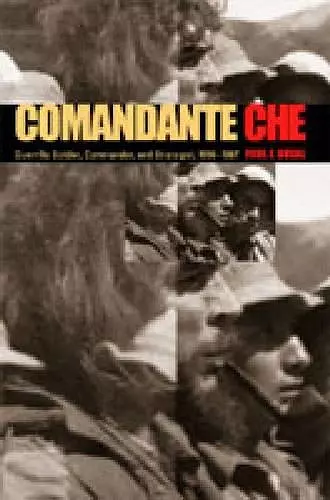Comandante Che
Guerrilla Soldier, Commander, and Strategist, 1956–1967
Format:Hardback
Publisher:Pennsylvania State University Press
Published:23rd Jun '03
Currently unavailable, and unfortunately no date known when it will be back
This hardback is available in another edition too:
- Paperback£27.99(9780271022628)

The victory of Fidel Castro’s rebel army in Cuba was due in no small part to the training, strategy, and leadership provided by Ernesto Che Guevara. Despite the deluge of biographies, memoirs, and documentaries that appeared in 1997 on the thirtieth anniversary of Guevara’s death, his military career remains shrouded in mystery. Comandante Che is the first book designed specifically to provide an objective evaluation of Guevara’s record as a guerrilla soldier, commander, and strategist from his first skirmish in Cuba to his defeat in Bolivia eleven years later.
Using new evidence from Guevara’s previously unpublished campaign diaries and declassified CIA documents, Paul Dosal reassesses Guevara’s impact as a guerrilla warrior and theorist, comparing his accomplishments with those of other guerrilla leaders with whom he has been ranked, including Colonel T. E. Lawrence, Mao Tse-Tung, and General Vo Nguyen Giap.
This reassessment reveals that Guevara was often underrated as a conventional military strategist, overrated as a guerrilla commander, and misrepresented as a guerrilla theorist. Guevara achieved his greatest military victory by applying a conventional military strategy in the final stages of the Cuban Revolution, orchestrating the defensive campaign that held off the Cuban army in the summer of 1958. As a guerrilla commander, he scored impressive victories in ambush after ambush in Bolivia, but in winning the battles he lost the war. He violated most of his own precepts during the Bolivian campaign, compelling analysts to question the validity of both his strategies and his command skills.
Though he is credited with developing foco theory, Guevara never attempted to advance a new theory of guerrilla warfare. He was a fighter, not a theorist. He wanted to defeat American imperialism by launching guerrilla campaigns simultaneously in Asia, Africa, and Latin America, but his tricontinental strategy resulted in failures first in the Congo and then in Bolivia. Comandante Che presents the full record of Guevara’s successes and failures, separating myth from reality about one of the twentieth century’s most controversial revolutionary figures.
“This is a solid, realistic study of a man, not an icon. As the title suggests, Paul Dosal portrays the complete Che Guevara, but, above all, he is unsurpassed in revealing Che the guerrilla soldier—the grunt, the guy in the mud, facing death and killing ruthlessly.”
—Charles Ameringer, Penn State University
“This outstanding work is the first comprehensive, objective, and truly professional study of the contribution of Che Guevara to the theory and practice of revolutionary guerrilla warfare in the twentieth century. It is based on a thorough and careful reading of the relevant primary sources—principally, Che’s voluminous campaign diaries, along with recently declassified CIA documents on his operations in the Congo and Bolivia.”
—Neill Macaulay, University of Florida
“He [Dosal] does not pretend to deal with Guevara’s personal life or his career as a bureaucrat in Cuba, but despite those deliberate omissions, if one could read only a single book about Guevara, this would not be a bad choice.”
—Henry Butterfield Ryan The Americas
“This is an interesting and clearly-written study of Che the soldier and strategist, intended ‘for both scholars and the general public.’”
—British Bulletin of Publications
“Comandante Che reflects years of richly detailed research; it attempts to address virtually every major controversy over Che’s relationship with Fidel Castro, Raul Castro, the Cuban Communist Party, various Latin American parties and guerrilla movements, and the Soviet and Chinese leaderships whose ideological disputes framed Guevara’s commitment to global armed struggle against the United States, imperialism and capitalism.”
—Brian Loveman HAHR
ISBN: 9780271022611
Dimensions: 229mm x 152mm x 23mm
Weight: 739g
352 pages